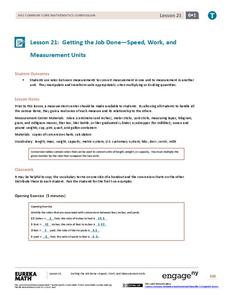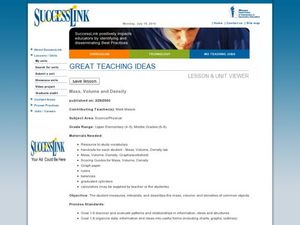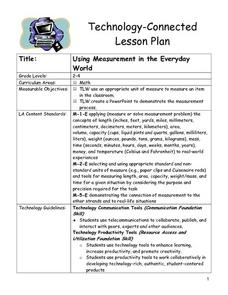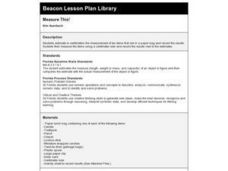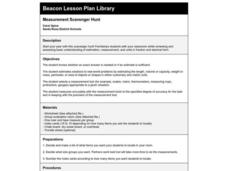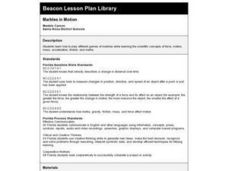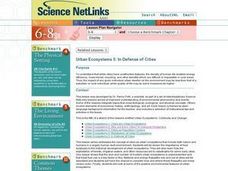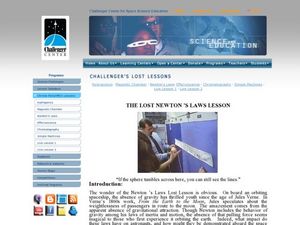Curated OER
Inertial Mass, Weight, and Newton's Second Law of Motion
The stage is set for you to guide future physicists through three forceful activities about motion. In the first, learners experiment with rolling carts to discover how objects interact. In the second, they inspect images of an object in...
Curated OER
Lesson 2: Measurement Tools
Elementary schoolers examine the uses of rulers, scales, and measuring cups. They determine the criteria for the use of each tool and visit different areas of school to find items that can be measured with these tools. Everyone takes...
Baylor College
Body Mass Index (BMI)
How do you calculate your Body Mass Index, and why is this information a valuable indicator of health? Class members discover not only what BMI is and practice calculating it using the height and weight of six fictitious individuals, but...
EngageNY
Getting the Job Done—Speed, Work, and Measurement Units
How do you convert from one measurement to another? Pupils use unit rates to convert measurements from one unit to another in the 21st segment in a 29-part series. They convert within the same system to solve length, capacity,...
Curated OER
#17 Determining the Accuracy of Selected Laboratory Glassware
Students calculate the volume of a specific mass of water placed in selected pieces of common laboratory glassware, using the density formula. They then determine the accuracy of the volumetric measurement for selected pieces of...
Curated OER
Balancing The Day Away In Grade 2
Second graders sped the day exploring about balance by playing with and making balancing toys. They discover how varying the amount and position of mass affects the toys' balance. Pupils explore gravity and balance while playing with the...
Curated OER
Scale Model of the Solar System
Young scientists gain a better understanding of space, the solar system and its vastness by creating a scale model. Students first need to calculate the distance between each of the nine planets according to the size of their scale. This...
Curated OER
Mass, Volume and Density
Students compare and contrast the mass, volume, and density of various objects. They use a triple beam balance, measure and record the volume of a cup of water, and discuss the results.
Curated OER
Using Measurement in the Everyday World
Students use an appropriate unit of measure to measure an item in the classroom. They create a PowerPoint to demonstrate the measurement process. Pupils are divided into pairs. Students use a concept map to discuss the terms for...
Curated OER
Hovercraft
Students assess human impact on water quality. They determine how the force of friction retards motion. Pupils describe and measure quantities that characterize moving objects and their interactions within a system: Time, Distance,...
Curated OER
Measure This!
Students estimate the measurement in centimeters for common classroom objects. They check their estimations, discuss the differences and write a paragraph summarizing the activity.
Curated OER
Measurement Scavenger Hunt
Students review estimation, measurement, fractions, decimals while familiarizing themselves with a new classroom at the beginning of the year.
Curated OER
More Volume Please! Don't Be Dense!
Fifth graders determine volume and density through their knowledge of mass, volume and density.
Curated OER
Marbles and Momentum
Students examine the law of conservation of momentum. In this physics lesson, students play marbles in order to compare the mass of the marble and velocities effects. Students receive directions of the marbles game and collect data while...
Curated OER
Marbles in Motion
Fourth graders explore how to play marbles while learning the scientific concepts of force, motion, mass, acceleration, friction, and inertia.
Curated OER
IS MASS THE SAME AS WEIGHT?
Students see the difference between weight and mass when they examine the method of measuring each of them.
Curated OER
How Do Your Students Measure Up?
Students participate in a paper folding activity that has them create a ruler for measuring to the closest 1/16th of an inch.
Curated OER
Go Car, Go!
Students design and build their own car. In this physics lesson, students collect data to determine the speed of the car. They plot the data on the graph analyze the relationship between variables.
Curated OER
Air Resistance and Friction
Physics learners experiment with three laboratory activities to learn about air resistance and friction. First, they use a hair dryer to move different sized spheres to determine the relationship between cross-sectional area and air...
Curated OER
Urban Ecosystems 5: In Defense Of Cities
Middle schoolers explain that while cities have unattractive features, the density of human life enables energy efficiency, mass transit, recycling, and other benefits which are difficult or impossible in rural areas. This is the fifth...
Curated OER
The Lost Newton's Laws Lesson
Students explore momentum. In this physics lesson, students perform an experiment in which two balls are released on slanted boards while students observe which ball will go the farthest and the fastest. Students define and explain...
Curated OER
The Effects of Photosynthesis on Plant Growth
Young scholars examine the process of photosynthesis; its products and reactants, and the sequence of the process. They diagram the light reactions, record observations of plants, and discuss how difficult it is to measure plant growth...
Curated OER
Intrinsic Viscosity
Students treat a high molecular weight polyvinyl alcohol polymer with potassium periodate. They measure the viscosity of polyvinyl alcohols.



